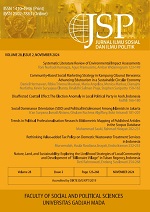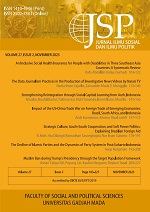Good Corporate Governance and Working Conditions at Petrol Stations: A Critical Political Economy Perspective
Ardiyansyah Ardiyansyah(1*)
(1) Ministry of Home Affairs, Indonesia
(*) Corresponding Author
Abstract
This study examines the claim that the benefits of good corporate governance (GCG) extend to all stakeholders, with a specific focus on the advantages for workers during operational processes. Conceptually, GCG connects all stakeholders by following its principles, without addressing power imbalances that arise from stakeholder class differences. This research highlights an underexplored aspect of GCG literature: power asymmetries among internal stakeholders, specifically the relationship between business owners and their workers. This study employs a multiple case study approach, drawing on in-depth interviews with 30 informants and document analysis of station records, regulatory frameworks, and prior studies, focusing on Pertamina petrol stations managed by Pertamina Patra Niaga and Pertamina Retail, which received “good” and “excellent” GCG ratings in 2023. The analysis of four petrol stations—operated either directly by Pertamina Retail or by private partners under Pertamina Patra Niaga—reveals that exploitative labour arrangements and substandard working conditions persist despite the formal implementation of GCG principles. These findings underscore that, in the absence of measures to address structural power asymmetries among stakeholders, the benefits of GCG are disproportionately captured by dominant actors, particularly capital owners within the corporate hierarchy.
Keywords
Full Text:
PDFReferences
Damianus, A., Ranay, F. B., Magallanes, T., & Encarnacion, M. J. (2022). The effect of corporate governance on the individual work performance of employees under responsibility of Center for Strategic Studies in Business and Finance The effect of corporate governance on the individual work performance of employees: The case of private higher education. IJBRS, 11(3), 82–98. https://doi.org/10.20525/ijrbs.v11i3.1763ï
Ayuso, S., Rodríguez, M. A., García-Castro, R., & Ariño, M. A. (2014). Maximizing Stakeholders’ Interests: An Empirical Analysis of the Stakeholder Approach to Corporate Governance. Business and Society, 53(3), 414–439. https://doi.org/10.1177/0007650311433122
Azmy, A. (2024). Employee Satisfaction Factors in The E-Commerce Company: The Mediating Role of Employee Engagement. Journal of Indonesian Economy and Business, 39(1), 28–56. https://doi.org/10.22146/jieb.v39i1.6936
Banda, M. (2023). Corporate Governance: A Conceptual Analysis. Research Journal of Finance and Accounting, 14(17), 41–61. https://doi.org/10.7176/rjfa/14-17-05
Bhatta, G. (2001). Corporate Governance and Public Management in Post-Crisis Asia. Asian Journal of Public Administration, 23(1), 1–32. https://doi.org/10.1080/02598272.2001.10800380
Brewster, Z. W., & Mallinson, C. (2009). Racial differences in restaurant tipping: A labour process perspective. Service Industries Journal, 29(8), 1053–1075. https://doi.org/10.1080/02642060902764343
Buckley, J. (2023). Formalising and Informalising Labour in Vietnam. Journal of Contemporary Asia, 53(2), 207–232. https://doi.org/10.1080/00472336.2021.2016244
Burawoy, M. (1983). Between the labor process and the state: The changing face of factory regimes under Advanced Capitalism. American Sociological Review, 48(5), 587. https://doi.org/10.2307/2094921
Carney, M., Gedajlovic, E., & Sur, S. (2011). Corporate governance and stakeholder conflict. Journal of Management and Governance, 15(3), 483–507. https://doi.org/10.1007/s10997-010-9135-4
Claessens, S. (2006). Corporate governance and development. World Bank Research Observer, 21(1), 91–122. https://doi.org/10.1093/wbro/lkj004
Darma, S. A. (2017). Kedudukan Hubungan Kerja Berdasarkan Sudut Pandang Ilmu Kaidah Hukum Ketenagakerjaan dan Sifat Hukum Publik dan Privat [The Legal Status of Employment Relationships from the Perspective of Labour Law Principles and the Nature of Public and Private Law]. Mimbar Hukum, 29(2), 221–234.
Fuchs, C. (2013). Political Economy and Surveillance Theory. Critical Sociology, 39(5), 671–687. https://doi.org/10.1177/0896920511435710
Ginzberg, E. (2014). Weapons of the Weak or The Culture of Everyday Resistance to Power Relations. GSTF Journal of Law and Social Sciences ( JLSS), 3(2). https://doi.org/10.7603/s40741-014-0003-4
Habibi, M. (2021). Laju Kapital dan Dinamika Kelas Ekonomi Informal Perkotaan [The Pace of Capital and the Dynamics of the Urban Informal Economic Class]. https://www.researchgate.net/publication/354916894
Habibi, M. (2023). Kelas pekerja dan kapital di Indonesia: Tinjauan awal [The Working Class and Capital in Indonesia: A Preliminary Review] (M. Habibi, Ed.). Penerbit Independen.
Hajawiyah, A., Wahyudin, A., Kiswanto, Sakinah, & Pahala, I. (2020). The effect of good corporate governance mechanisms on accounting conservatism with leverage as a moderating variable. Cogent Business and Management, 7(1). https://doi.org/10.1080/23311975.2020.1779479
Istianingsih. (2021). Earnings Quality as a link between Corporate Governance Implementation and Firm Performance. International Journal of Management Science and Engineering Management, 16(4), 290–301. https://doi.org/10.1080/17509653.2021.1974969
Jaros, S. J. (2000). Labor Process Theory. International Studies of Management & Organization, 30(4), 25–39. https://doi.org/10.1080/00208825.2000.11656798
Karpoff, J. M. (2021). On a stakeholder model of corporate governance. Financial Management, 50(2), 321–343. https://doi. org/10.1111/fima.12344
Kitwattanavong, M., Prueksasit, T., Morknoy, D., Tunsaringkarn, T., & Siriwong, W. (2013). Health Risk Assessment of Petrol Station Workers in the Inner City of Bangkok, Thailand, to the Exposure to BTEX and Carbonyl Compounds by Inhalation. Human and Ecological Risk Assessment, 19(6), 1424–1439. https://doi. org/10.1080/10807039.2012.685814
Koeswayo, P. S., Haryanto, H., & Handoyo, S. (2024). The impact of corporate governance, internal control and corporate reputation on employee engagement: a moderating role of leadership style. Cogent Business and Management, 11(1). https://doi.org/10.1080/23311975.2023.2296698
Laffont, J., & Martimort, D. (1997). Collusion Under Asymmetric Information. Econometrica, 65, 4.
Li, T. M. (2017). The price of Un/Freedom: Indonesia’s colonial and contemporary plantation labor regimes. Comparative Studies in Society and History ,59(2), 245–276. https://doi.org/10.1017/S0010417517000044
Mrabure, K. O., & Abhulimhen-Iyoha, A. (2020). Corporate Governance and Protection of Stakeholders Rights and Interests. Beijing Law Review, 11(01), 292–308. https://doi.org/10.4236/blr.2020.111020
Novianto, A., Keban, Y. T., & Hernawan, A. (2021). Mendorong Kerja Layak dan Adil bagi Pekerja Gig: Kajian Awal tentang Ekonomi Gig di Indonesia [Promoting Decent and Fair Work for Gig Workers: A Preliminary Study of the Gig Economy in Indonesia]. https://www.researchgate.net/ publication/357930635aa
Nurwulandari, A., Hasanudin, H., Subiyanto, B., & Pratiwi, Y. C. (2022). Risk Based bank rating and financial performance of Indonesian commercial banks with GCG as intervening variable. Cogent Economics and Finance, 10(1). https://doi.org/10.1080/23322039.2022.2127486
Pertamina Retail. (2024). 2023 Annual Report: Strategic Excellence for Tomorrow. www. pertaminaretail.com
Priya, A. (2021). Case Study Methodology of Qualitative Research: Key Attributes and Navigating the Conundrums in Its Application. Sociological Bulletin , 70(1), 94–110. https://doi.org/10.1177/0038022920970318
Roggia, S. M., de França, A. G., Morata, T. C., Krieg, E., & Earl, B. R. (2019). Auditory system dysfunction in Brazilian gasoline station workers. International Journal of Audiology, 58(8), 484–496. https://doi.org/10.1080/14992027.2019.1597286
Rowlinson, M., & Hassard, J. (2000). Marxist Political Economy, Revolutionary Politics, and Labor Process Theory. Studies of Mgt. & Org, 30(4), 85–111.
Savitri, P. I. (2019, July). BPH Migas ajukan kuota Pertalite hingga 33,23 juta KL untuk tahun 2025 [BPH Migas Proposes a Quota of up to 33.23 Million Kilolitres of Pertalite for 2025]. https://www.antaranews.com/berita/4123083/bph-migas-ajukan- kuota-pertalite-hingga-3323-juta-kl-untuk- tahun-2025.
Scott, J. C. (1985). Weapons of The Weak: Everyday Forms of Peasant Resistance. Yale University.
Sewell, G., & Wilkinson, B. (1992). ‘Someone to watch over me’: Surveillance, discipline and the just-in-time labour process. Sociology, 26(2), 271–289.
Sinwell, L. (2012). Sharpening the Weapons of the weak: a response to Carin Runciman. Review of African Political Economy, 39(134), 665–671. https://doi.org/10.1080/03056244.2012.738798
Stout, L. (2012). The Shareholder Value Myth (1st ed.). Berrett-Koehler Publisher.
Veen, A., Barratt, T., & Goods, C. (2020). Platform-Capital’s ‘App-etite’ for Control: A Labour Process Analysis of Food-Delivery Work in Australia. Work, Employment and Society, 34(3), 388–406. https://doi.org/10.1177/0950017019836911
Yermakova, A., & Ratnikov, V. (2020). Kelas dan Perjuangan Kelas [Class and Class Struggle] (P. Ikhsan, Trans.). Red Book.
Yin, R. K. (2009). Case Study Research: Design and Methods. SAGE Publisher.
Article Metrics
Refbacks
- There are currently no refbacks.
Copyright (c) 2025 Jurnal Ilmu Sosial dan Ilmu Politik

This work is licensed under a Creative Commons Attribution-ShareAlike 4.0 International License.























